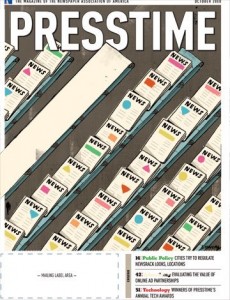Presstime, the magazine about newspapers published by the Newspaper Association of America is going out of print. I think the irony speaks for itself.
Losing the print version of the publication will save the association about $500,000 according to president and CEO John Sturm as quoted in the New York Times.
The other big newspaper trade group, The American Society of Newspaper Editors (ASNE) cancelled the annual conference this year because executives can’t even come up with the coin to make the trip.
Memberships in both groups are declining, and so is the voice those trade groups brought to the dark corners of Washington fighting for first amendment rights and speaking out on other media related business and editorial issues, from shield laws to ethics and best practices.
The same thing is happening with a group to which I’ve belonged for nearly 30 years – RTNDA. The association’s Communicator magazine just went out of print, and there’s a scramble to re-define the organization’s purpose and the nature of its membership. Attendance national conferences tanked years ago, forcing a merger with the National Association of Broadcaster’s annual convention. Not an ideal situation.
Other groups like IRE and SPJ are also sucking canal water. With layoffs in the thousands, and a total lack of any professional connection among those who remain – the future of the major industry and craft association groups looks bleak indeed.
Some of these entities certainly needed reform. Being closest to RTNDA, I can say the association needed a major re-tooling on a number of fronts.
But the slow demise of the industry’s trade and professional organizations is bad news. It’s bad news for the industry as a whole, for the practitioners who rely on it as a touchpoint to connect with others, and for the public which is best served when standards and practices exist in some sort of framework that goes beyond the simple measurement of profit.
In the long run, without coordinated efforts to protect journalists, protect the freedom of information, establish best practices and advocate in the courtrooms and committee rooms of our legislative bodies – the quality of our access, our information and our journalism will suffer.
Journalists will find something else to do. The public however won’t find a replacement for professional journalism – even if they’re told otherwise.









